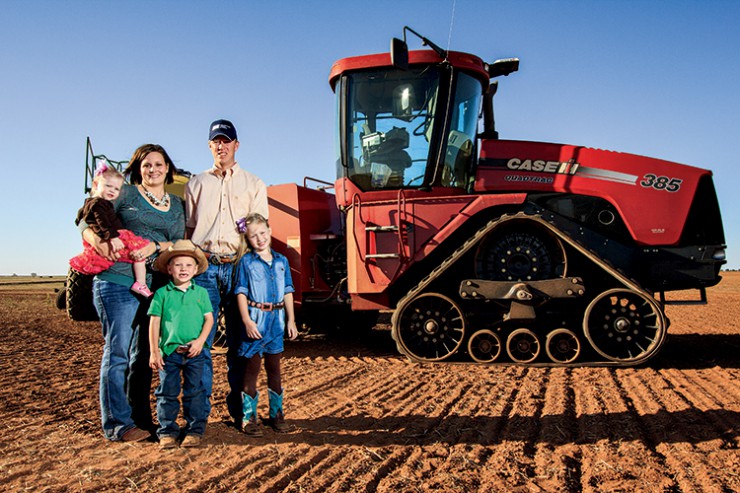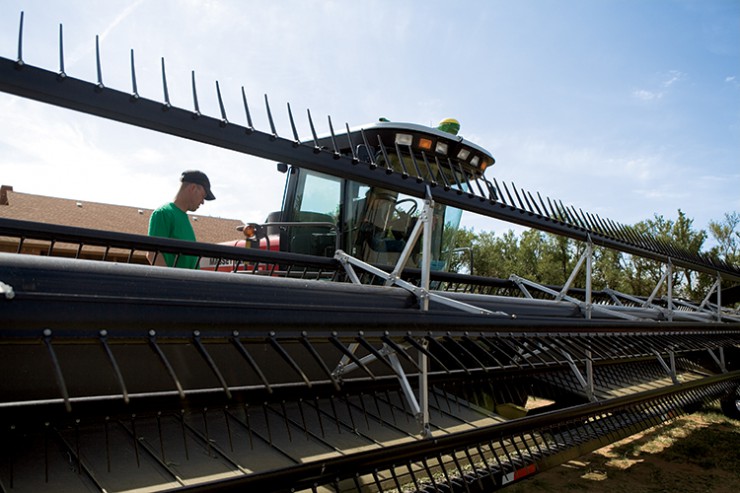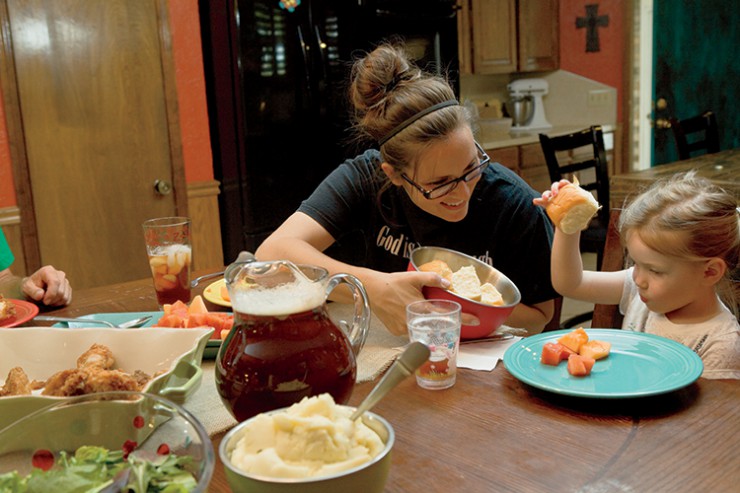Home > Oklahoma > Oklahoma Farm to Table > Young Farmers Follow in Family Footsteps
Young Farmers Follow in Family Footsteps

A late freeze in spring 2014 seemed to seal the deal for wheat and soybean farmer Zac Harris, but as the third generation of a family that’s been farming since the early 1900s, he’s no quitter. Harris operates a 7,000-acre farm in Hobart and grows wheat, soybeans, alfalfa, grain sorghum and cotton. In 2013, Harris and his wife Amy were chosen as an Oklahoma Farm Bureau Harvest Watch Family.
The Harvest Watch program follows young farmers across the state as they meet the challenges of farming.
For Oklahoma wheat farmers, the 2014 harvest is expected to yield 40 percent less than 2013, according to estimates from the U.S. Department of Agriculture. Oklahoma was the fifth-largest wheat producing state in 2013, netting more than $700 million in revenue, but a long-lasting drought has dimmed the outlook for harvests in the near future.
Fortunately, the threat of leaner days ahead hasn’t deterred young farmers like Harris. According to the 2012 USDA Census of Agriculture, the average age of the U.S. farmer has been trending upward for 30 years and is now close to 60. Only 6 percent of farmers are under age 35, making it critical that young farmers are able to sustain themselves in order to fill the gap left by retirees.
“There’s nothing like the feeling of producing food and fiber for the rest of the world,” Harris says. “But the hard work and the risk involved can be difficult. I have friends who think I’m rich because I’m a farmer but I’d gladly trade debt with them.”
Harris says what keeps him going is his faith in God and his passion for farming, which he says he’s felt for as long as he can remember.

Farming Is a Family Tradition
“I can remember laying in the hall that my dad had to walk down in order to leave the house [to go to the field], and I’d sleep in the hall so he wouldn’t leave me,” he says.
Today, he works alongside his father, younger brother and 86-year-old grandfather. He says while he has gained a lot of wisdom and knowledge from his elders, he’s also learned to use technology to his advantage.
“I use my smartphone all the time. My dad and granddad are always asking me to check the weather or check this or check that on my phone. It’s amazing,” Harris says. “My sprayer is 120 feet and to think that my granddad used to say he could throw a rock across what he plowed in one day. That just blows me away. I’d have to be a lot tougher if I was farming 50 years ago.”
Harris also credits his education away from the farm as having helped him better manage his operation. He graduated from Oklahoma State University (OSU) in 2003 with a degree in agriculture economics.

Education Is An Advantage
“Margins are thinner than they used to be. We’re borrowing three times the money than we were when I had just graduated school to operate on the same or less margin, so the risk is a whole lot greater. Price swings, etc. can take you out. You may not get to farm next year if you don’t do the right things and really dot your I’s and cross your T’s, and I think that my education gave me a broader view of how to manage risks,” he says.
Harris’ wife Amy graduated from OSU with a degree in agriculture marketing and puts her education to use managing the farm’s social media profiles and blog. The couple uses social media to advocate for the state’s agriculture industry.
“I’m in several groups that advocate for ag because the general public has less and less of an idea of what production agriculture really is and where their food comes from,” Zac says. “Amy tries to post video and photos on Facebook of what we’re doing and how we do it. We’re trying to do our part to educate consumers. We feel like somebody’s got to stand up for agriculture.”
Zac and Amy Harris are also advocating for agriculture in a more personal way. They are teaching their children about farming and about their own family heritage on the farm. Their oldest has shown mini-Herefords and is now working on her 4-H Youth Expo Steer project.



